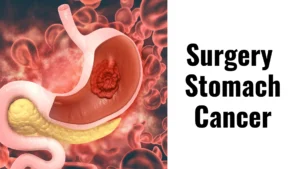Surgery for Stomach Cancer
Stomach cancer, also known as gastric cancer, is a serious disease that affects thousands of people worldwide. Surgery is one of the main treatment options for stomach cancer, and it can be both curative and palliative. In this article, we will explore the different aspects of surgery for stomach cancer, including the procedures involved, risks and side effects, life after surgery, available support, and frequently asked questions.

Palliative Surgery
Palliative surgery aims at relieving symptoms, improving quality of life, and prolonging survival for patients with advanced or metastatic stomach cancer. This type of surgery does not aim to cure the disease but rather to alleviate pain and discomfort caused by the tumor or its related complications. Examples of palliative surgical procedures for stomach cancer include stomach bypass surgery, stent placement to keep the digestive tract open, and gastrectomy to remove a portion of the stomach to provide relief.
Procedure
The surgical procedure for stomach cancer varies depending on the stage of the disease and the extent of the tumor. The most common surgical approach is gastrectomy, which involves removing a portion or the entire stomach. This procedure may also include the removal of nearby lymph nodes to check for cancer spread. Laparoscopic surgery, a minimally invasive technique, is becoming increasingly common as it enables smaller incisions, less pain, and quicker recovery. The specifics of the surgery are determined by the individual’s condition and the surgeon’s expertise.
Risks and Side Effects
As with any surgery, there are inherent risks involved in stomach cancer surgery. These risks include infection, bleeding, blood clots, adverse reactions to anesthesia, and damage to surrounding organs or tissues. Some potential side effects of stomach cancer surgery include difficulty swallowing, changes in bowel habits, dumping syndrome (rapid emptying of the stomach contents into the small intestine), malnutrition, and weight loss. It is crucial for patients to discuss these risks and side effects with their healthcare team to have realistic expectations and adequate post-operative care.
Life After Surgery
Life after stomach cancer surgery can bring significant changes in one’s daily routine and overall well-being. Learning to adjust to a new diet, which may include smaller, more frequent meals, avoiding certain foods, and taking supplements, is vital. Emotional support and counseling may be beneficial in dealing with the challenges of recovery and adjusting to physical changes. In some cases, individuals may experience long-term side effects, such as digestive problems or nutritional deficiencies. Regular follow-up appointments and a multidisciplinary approach involving healthcare professionals can help ensure a smoother transition to life after surgery.
Support
Receiving a stomach cancer diagnosis and undergoing surgery can be overwhelming for patients and their loved ones. It is important to remember that support is available. Support groups, both in-person and online, provide a platform where patients can connect with others facing similar challenges, share experiences, and gather valuable information. Additionally, healthcare organizations, such as cancer centers, often offer counseling services, nutritional guidance, and complementary therapies to enhance well-being during and after treatment. Seek out these resources to harness the support needed during this journey.
FAQs
1. Is surgery the only treatment option for stomach cancer?
No, surgery is one of the main treatment options for stomach cancer, but other approaches such as radiation therapy, chemotherapy, targeted therapy, and immunotherapy may also be used. The treatment plan is determined based on the stage and characteristics of the tumor.
2. How long does it take to recover from stomach cancer surgery?
The recovery time after stomach cancer surgery varies from person to person and depends on various factors such as the extent of the surgery, age, overall health, and complications. Generally, it can take several weeks to months to fully recover.
3. Will I be able to eat normally after stomach cancer surgery?
While it may take time to adjust to a new diet and potential dietary restrictions, many individuals can eventually return to eating a regular diet after stomach cancer surgery. In some cases, individuals may need to make permanent dietary modifications.
Summary
Surgery plays a crucial role in the treatment of stomach cancer, both as a curative approach and for palliative purposes. The specific procedure depends on the individual’s condition and the stage of cancer. It is essential for patients to understand the risks, potential side effects, and the adjustments required after surgery. Seeking the support of healthcare professionals and joining support groups can greatly assist in coping with the challenges and improving overall well-being. Remember that life after surgery may bring changes, but with adequate care and support, a fulfilling life can be possible.